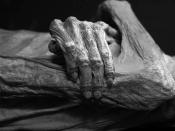The mortal bodies we posses are not designed to live forever. Consequently, death is an inevitable constituent of being alive. It stems from the point when the heart stops beating and all the blood ceases to circulate within us. As we become deprived of oxygen, an essential element, a cascade of cellular death takes off, beginning with brain cells and ending with skin cells (Volt, 2002). Death is a process rather than a single defining event. Specifying the precise moment of death usually involves deciding on a point from which there can be no return. This conflicting moment has been the topic of countless feudal debates throughout the history of humankind. According to the ethical perspectives of human rights activists, individuals have the rights and freedoms to chose their own time of death under convincingly irreversible circumstances (Blank, 1994). The clashing opinions of society have evidently escalated the argument concerning when the termination of a life is acceptable.
This comparison of the individual's quality of life to modern ethics gives rise to the litigious issue of euthanasia. To most people, the idea of ineluctable death becomes less devastatingly daunting when there is acceptance of the continued existence of their soul or spirit. Some consider death as a life cut short or as a blessing that relieves you from your worldly suffering. The belief in a life after death is a strong conviction evident in many cultures and religions around the world. Whether they believe in heaven, hell, or reincarnation; it is a shared notion that death is not the terminal experience in life (Rasekh, 2007).
Edgar Allen Poe once articulately stated that, "The boundaries which divide Life from Death are, at best, shadowy and vague. Who shall say where the one ends, and where the other begins?" (Poe, 2008). One...


